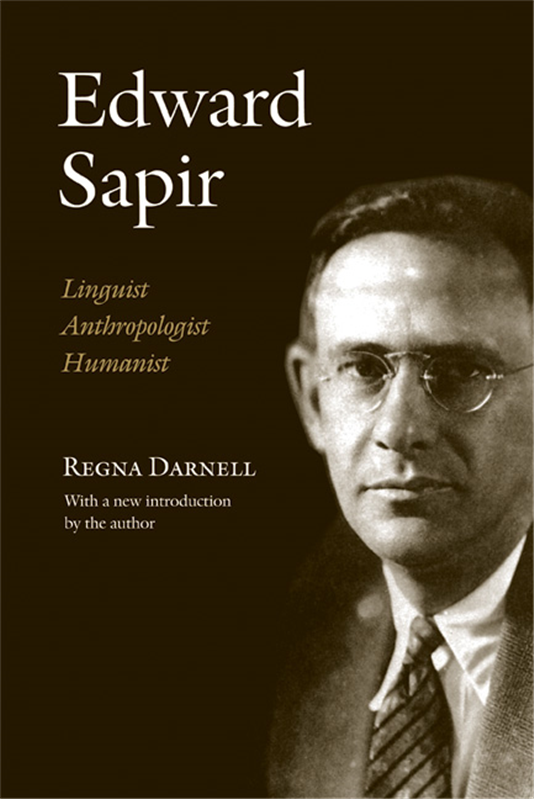 Regna Darnell
Regna Darnell
Edward Sapir: Linguist, Anthropologist, Humanist
This first full-scale biography of Edward Sapir (1884–1939) does justice to the life and ideas of the most distinguished linguist of Boasian anthropology, who contributed substantially to the professionalization of linguistics as an independent discipline.
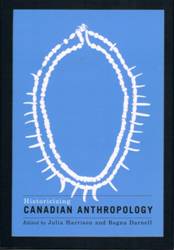 Historicizing Canadian Anthropology (editor)
Historicizing Canadian Anthropology (editor)
Historicizing Canadian Anthropology is the first significant examination of the historical development of anthropological study in this country. It addresses key issues in the evolution of the discipline: the shaping influence of Aboriginal-anthropological encounters; the challenge of compiling a history for the Canadian context; and the place of international and institutional relations. The contributors to this collection reflect on the definition and scope of the discipline and explore the degree to which a uniquely Canadian tradition affects anthropological theory, practice, and reflexivity.
Historicizing Canadian Anthropology is a watershed that will revitalize critical reflexivity within the field. With contributions from a broad cross-section of anthropologists - from senior scholars to doctoral students - this book is essential reading for practising Canadian anthropologists, their students, and others who seek to understand the historical contours of the field. 2006, University of British Columbia Press.
Daniel Garrison Brinton: The 'Fearless Critic' of Philadelphia
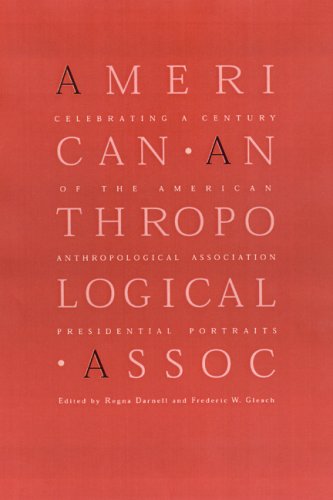 Celebrating a Century of the American Anthropological Association: Presidential Portraits (editor)
Celebrating a Century of the American Anthropological Association: Presidential Portraits (editor)
During the past century the American Anthropological Association (AAA) has borne witness to profound social, cultural, and technical changes, transformations that have affected anthropologists and the people they work with across the planet. In response to such global changes, anthropology continues to evolve into an increasingly complex and sophisticated discipline with a dynamic range of flourishing subfields.
This volume contains the memorable stories of the seventy-seven men and women who have led the AAA during the past century. The list of the association's presidents reads like a roster of influential scholars from various specializations within anthropology. Their histories cumulatively reflect the trends in interpretive thought and fieldwork methodology that have emerged during the past ten decades.
For each president the book provides a photograph and a biography replete with personal anecdotes, career highlights, and information about his or her contributions to the development of the discipline of anthropology. Important works by each president are listed separately in the back of the volume. An introduction by Regna Darnell and Frederic W. Gleach summarizes the first century of the AAA and contextualizes the individual stories. 2002, University of Nebraska Press.
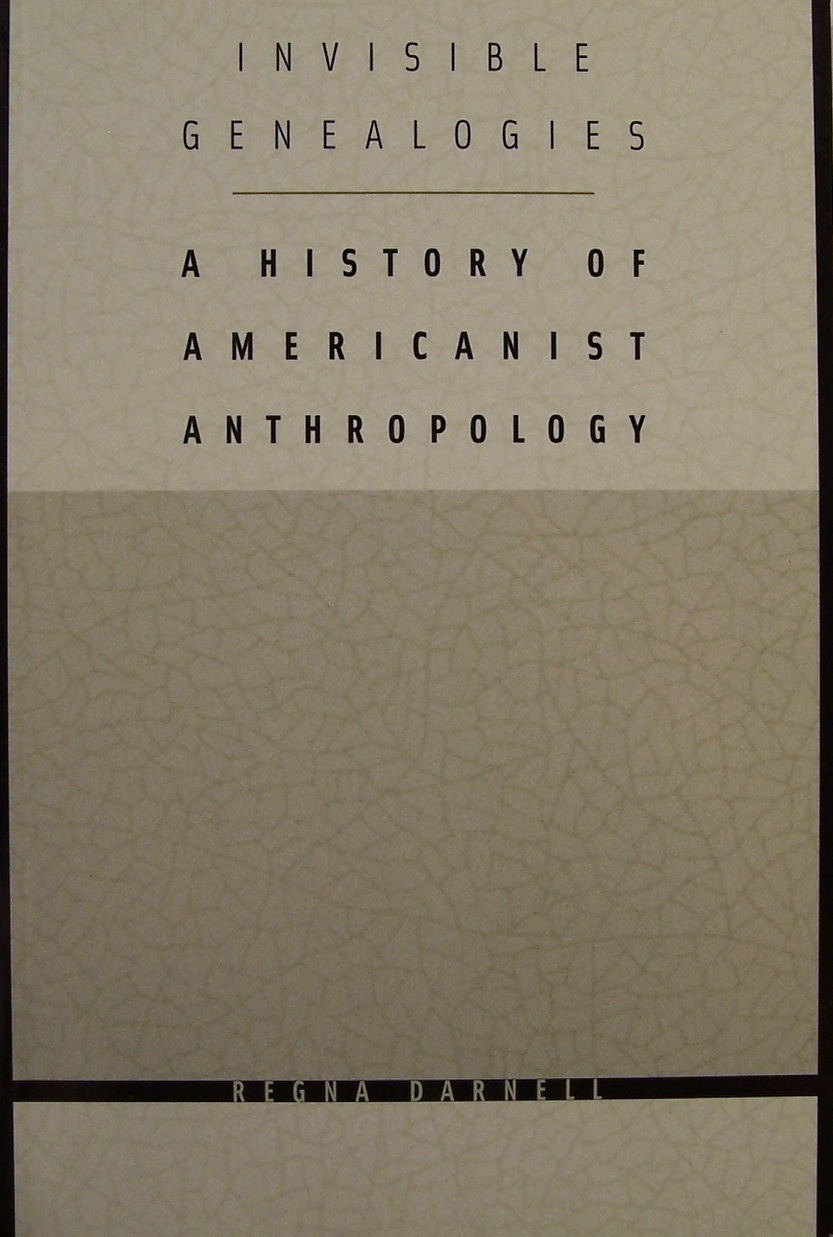 Invisible Genealogies: Americanist Persistences in Contemporary Anthropology
Invisible Genealogies: Americanist Persistences in Contemporary Anthropology
Invisible Genealogies is a landmark reinterpretation of the history of anthropology in North America. During the past two decades, theorizing by many American anthropologists has called for an "experimental moment" grounded in explicit self-reflexive scholarship and experimentation with alternate forms of presentation. Such postmodern anthropology has effectively downplayed connections with past luminaries in the field, whose scholarship is perceived to be uncomfortably colonialist and nonreflexive. Ironically, as the American Anthropological Association nears its one hundredth anniversary and interest in the history of the discipline is at an all-time high, that history has been effectively presented as removed from and irrelevant to the new generation.
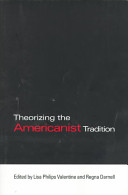 Theorizing the Americanist Tradition (editor)
Theorizing the Americanist Tradition (editor)
Contributions From Twenty-Five Distinguished Scholars Are Brought together here to provide a comprehensive, accessible, state of the art appraisal of interdisciplinary research at the boundaries of anthropology, linguistics and Native Studies. The collection seeks to correct the prevailing notion that the Americanist tradition in anthropology. (typified by Franz Boas and his colleagues) is a theoretical.
Participants in this dialogue accepted the challenge of making their underlying theoretical assumptions explicit. The papers range from the history of anthropology and linguistics to present innovations within this tradition. Issues of authenticity lead to examination of changing traditions in text and literacy in linguistics and education, and in emerging contemporary discourse spanning the Americas.
The volume is framed by Coyote, the quintessential American trickster who is the inspiration for much of the volume's play with tradition and change, with the construction of identity through discourse, and with the interaction of Americanists and First Nations/Native American communities. Remarks on the future of the Americanist tradition forms a critical part of this collection. 1999, University of Toronto Press.
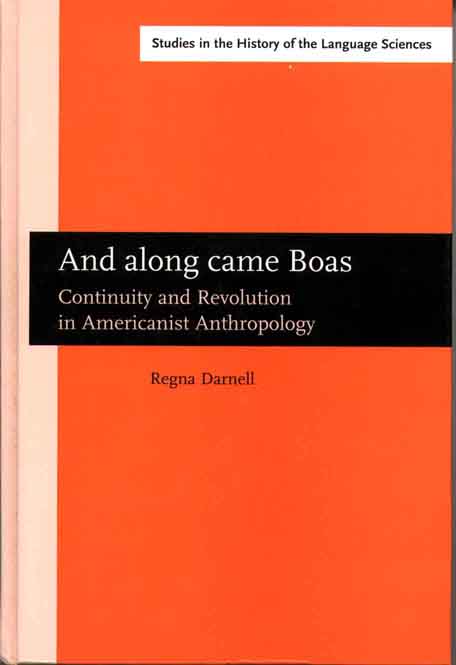 And Along Came Boas: Continuity and Revolution in Americanist Anthropology
And Along Came Boas: Continuity and Revolution in Americanist Anthropology
The advent of Franz Boas on the North American scene irrevocably redirected the course of Americanist anthropology. This volume documents the revolutionary character of the theoretical and methodological standpoint introduced by Boas and his first generation of students, among whom linguist Edward Sapir was among the most distinguished. Virtually all of the classic Boasians were at least part-time linguists alongside their ethnological work. During the crucial transitional period beginning with the founding of the Bureau of American Ethnology in 1879, there were as many continuities as discontinuities between the work of Boas and that of John Wesley Powell and his Bureau. Boas shared with Powell a commitment to the study of aboriginal languages, to a symbolic definition of culture, to ethnography based on texts, to historical reconstruction on linguistic grounds, and to mapping the linguistic and cultural diversity of native North America. The obstacle to Boas's vision of anthropology was not the Bureau but the archaeological and museum establishment centred in Washington, D.C. and in Boston. Moreover, the scientific revolution was concluded not when Boas began to teach at Columbia University in New York in 1897 but around 1920 when first generation Boasians cominated the discipline in institutional as well as theoretical terms. The impact of Boas is explored in terms of theoretical positions, interactional networks of scholars, and institutions within which anthropological work was carried out. The volume shows how collaboration of universities and museums gradually gave way to an academic centre for anthropology in North America, in line with the professionalization of American science along German lines during the late 19th and early 20th centuries. 1998, John Benjamins Publishing.






